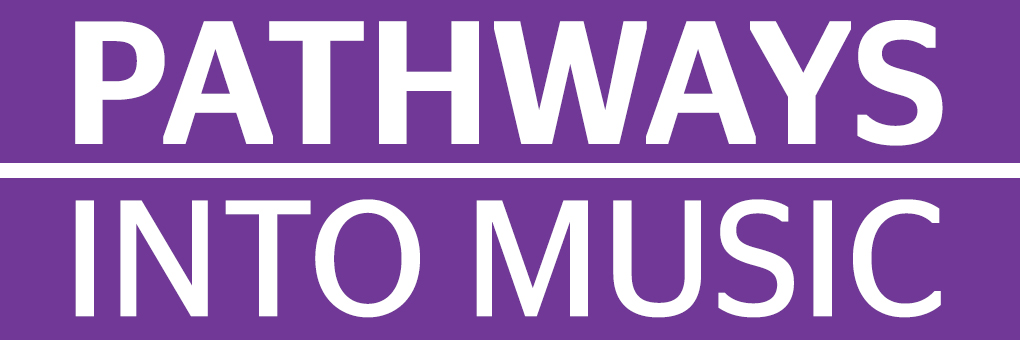SUPPORTING MUSIC EDUCATORS
Understanding The Pathways Into Music
A professional development programme for music educators

Presented by the Pathways Into Music Foundation and supported by Arts Council England, this programme for music educators, education hubs and talent development organisations consists of a two-day in-person event in Derby on 27 and 28 April, plus three accompanying webinars.
What’s it all about?
Join us on this new professional development programme that will put the focus on careers and trends in the music business, providing music educators with the information, knowledge and contacts they need to advise and support students who seek to pursue a career in music.
What will it cover?
Over our two day event and three accompanying webinars we will map the different career pathways in music, for both those making music and those working in the industry.
We’ll explain what early-career music-makers need to know about music rights and fanbase building in order to embark on a frontline artist career.
Plus we’ll run through the latest music business trends and sign-post the best resources.
What will you learn?
Participants will get an overview of all the different strands of music education and the music industry, and the different career routes, including as a frontline artist, portfolio musician, industry executive or music entrepreneur.
We will run through what young people need to know to get their careers started – including around music rights and fanbase building – and we’ll offer guidance on how educators can best provide this knowledge and information, and what resources and initiatives to sign-post.
What is the format?
A mix of lectures, discussions and Q&A sessions led by a team of music industry experts. There will also be plenty of opportunities to network with and learn from each other, to share knowledge and experience, and to better understand the different strands of music education.
When and where will it take place?
On Saturday 27 and Sunday 28 April at Derby Conference Centre, with accompanying webinars on Wednesday 24 April and Wednesday 1 and 8 May, which will be delivered via Zoom.
Who is it for?
Anyone involved in educating or supporting young people making music from key stage three (aged eleven) or above in the UK, including: music teachers in schools, instrument tutors, and FE and HE lecturers, plus people working for music education hubs and talent development organisations.
What is the cost and commitment?
Thanks to the kind support of Arts Council England, participation is free. You just need to commit to attend the full in-person event and all three webinars, and get yourself to the Derby Conference Centre.
APPLICATIONS HAVE NOW CLOSED FOR THIS PROGRAMME.
WEDNESDAY 24 APRIL – 17.00-18.00
webinar delivered via Zoom
PATHWAYS INTO MUSIC
To kick-start the proceedings, we will consider the different career routes in music by hearing from a number of music-makers and music industry professionals. You’ll hear how those people got their start in the business, how they pursued different opportunities, and the projects they are involved in today.
SATURDAY 27 APRIL – 10.30-18.30 followed by a dinner
in person at Derby Conference Centre, London Road, Derby, DE24 8UX
10.30-11.45 MAPPING MUSIC EDUCATION
This session looks at all the different strands of music education, including in schools, colleges and universities; instrument tuition and exam programmes; talent development organisations and youth groups; and online learning and industry-led initiatives.
The aim is to understand how the different strands fit together, and the role each strand can play in supporting those young people who want to pursue a career in music.
12.00-13.00 MAPPING THE MUSIC INDUSTRY
This session looks at the different ways frontline artists generate income around their music and how the music industry is structured around those revenue streams.
It then outlines the key business partners artists work with, creating a map of the music industry which works at both a national and local level. Using that map, we will explain how to map local music industries, identifying key players and gaps in support.
13.00-14.00 LUNCH
A free lunch will be provided.
14.00-15.30 MAPPING MUSIC CAREERS: MUSIC-MAKERS
The Pathways Into Music Foundation has been mapping music careers, tracking the career route taken by both frontline artists and portfolio musicians.
In this session we run through this work, putting the spotlight on the DIY Phase before music-makers start working with the music industry. This is the stage where those music-makers rely heavily on educators to access the knowledge and support they need.
16.00-17.30 MAPPING MUSIC CAREERS: INDUSTRY ROLES
What about the opportunities to work in music behind the scenes? Revisiting our map of the music industry, this session explores the different roles in the music business, and explains how young people can go about building the skills and knowledge they need to pursue this kind of music career.
17.30-18.00 Q&A
Wrapping up the day, we’ll answer any additional questions, and participants can share their perspectives, with each other and the Pathways Into Music Foundation directors.
18.00 DINNER
A free meal will be provided.
SUNDAY 28 APRIL 09.30-13.30
in person at Derby Conference Centre, London Road, Derby, DE24 8UX
09.30-11.00 MUSIC COPYRIGHT EXPLAINED
As soon as early-career music-makers write songs and record tracks they create copyrights. If they collaborate with other people, they will co-own those copyrights.
This session runs through the five key copyright facts all young creators need to understand in order to effectively manage, monetise and protect their intellectual property – and suggests how and when to communicate key information to those creators.
11.30-13.00 THE DIY PHASE TOOLKIT
This session runs through all the knowledge and skills that DIY Phase artists need in order to start to build a career in music. It also reviews the resources and support available for DIY Phase artists, including online resources, local and national talent development programmes, industry and media-led initiatives, and funding schemes.
It aims to help educators sign-post the credible and legitimate resources and support that is available to the young people they are working with.
13.00-13.30 Q&A
Wrapping up the weekend, we’ll answer any additional questions, and participants can share their perspectives, with each other and the Pathways Into Music Foundation directors.
WEDNESDAY 1 MAY – 17.00-18.00
webinar delivered via Zoom
THE DIY PHASE: FANBASE BUILDING
For aspiring frontline artists one of the most important tasks in the DIY Phase is fanbase building – ie finding an audience.
This session provides a guide to all the key tools and tactics DIY Phase artists can employ as part of this process, providing practical tips that educators can then share with the early-career music-makers they support.
WEDNESDAY 8 MAY – 17.00-18.00
webinar delivered via Zoom
MUSIC BUSINESS TRENDS
The music industry is constantly evolving as the way people consume music and connect with the artists they love changes, and as new technologies impact on music-making, music marketing and the music experience.
This session provides an up-to-date guide to the very latest trends, developments and debates in the music business.
‘Understanding The Pathways Into Music’ will be led by Phil Nelson, Chris Cooke and Sini Timonen.
Phil Nelson is an artist manager and music business educator. He has worked as an artist manager since 1998. Current clients include Matt Hales, Duke Special and Sweet Billy Pilgrim.
Previous clients include The Longpigs and The Levellers, the latter of whom pioneered the direct-to-fan approach that is now industry standard and worked with Phil to launch their own 15,000 capacity festival Beautiful Days, which continues to this day.
Phil is also an experienced educator, currently teaching music business at BIMM. Since 2017 he has been working with CMU on mapping music careers, music industries and music education, research work that resulted in the creation of the Pathways Into Music Foundation.
Throughout his career, Phil has played an active role in the wider music industry. He was Vice Chair of the Music Managers’ Forum from 1997 to 2007 and he co-founded The Great Escape showcase festival with Martin Elbourne and Jon McIldowie. He’s also led a number of initiatives for BIMM helping students to connect with and gain practical experience in the music industry.
Chris Cooke is co-Founder and MD of CMU, a company that helps people navigate and understand the music business. It does this through media like the CMU Daily bulletin and Setlist podcast; a consultancy unit and training business; and a future talent programme.
Via CMU, Chris writes, talks, teaches and consults about the music industry. He also wrote the acclaimed ‘Dissecting The Digital Dollar’ book and ‘Music Copyright Explained’ guide, and curated and hosted twelve editions of The Great Escape Conference.
Chris also pursues other projects via UnLimited Media, through which he also publishes cultural recommendations service ThisWeek Culture and ThreeWeeks at the Edinburgh Festival; and helped to launch and develop the Taylor Bennett Foundation, which is enabling more ethnic diversity in the communications industry.
With degrees in English and Law, Chris regularly talks about and comments on the music business, intellectual property, and the wider media and communication sectors.
Dr Sini Timonen is an experienced researcher, lecturer and education manager. She is currently the Course Convenor of MA Popular Music Practice at BIMM University, as well as Course Leader at BIMM Institute London.
Her research interests include popular music and gender, popular music and class, career opportunities in the contemporary music industries and person-centered approaches to learning and teaching.
Her AHRC-funded PhD thesis, completed at City University London, investigated female musicians’ contribution to popular music in England between the years of 1962 and 1971.






